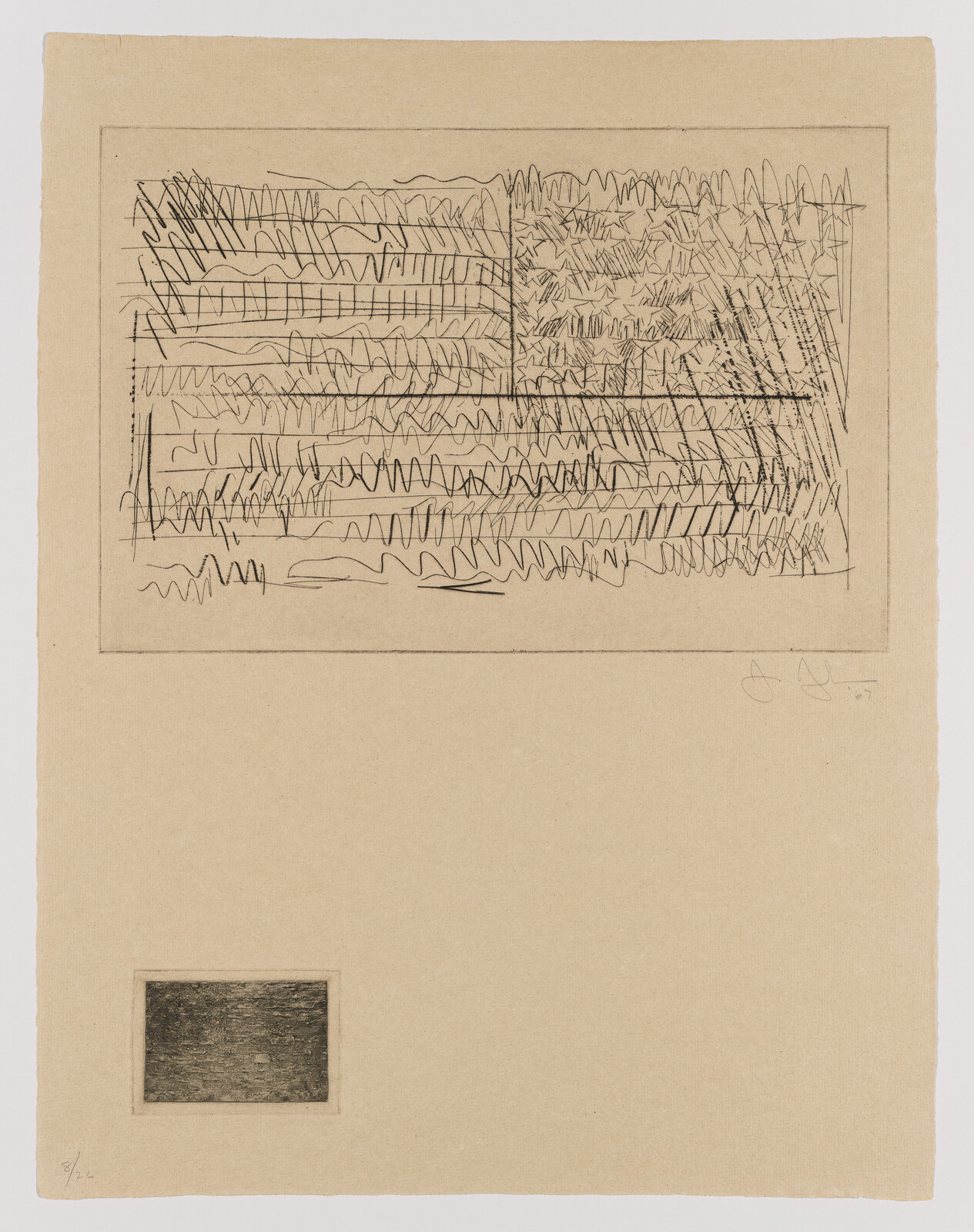In 1954, Jasper Johns began painting what would become one of his signature emblems: the American flag. As an iconic image--comparable to the targets, maps, and letters that he also has depicted--Johns realized that the flag was “seen and not looked at, not examined.” The execution and composition of Three Flags elicit close inspection by the viewer. The painting draws attention to the process of its making through Johns’s use of encaustic, a mixture of pigment suspended in warm wax that congeals as each stroke is applied; the resulting accumulation of discrete marks creates a sensuous, almost sculptural surface. The work’s structural arrangement adds to its complexity. The trio of flags—each successively diminished in scale by about twenty-five percent—projects outward, contradicting classical perspective, in which objects appear to recede from the viewer’s vantage point. By shifting the visual emphasis from the flag’s emblematic meaning to the geometric patterns and variegated texture of the picture surface and the canvas structure, Johns explores the boundary between abstraction and representation. As he remarked, this painting allowed him to “go beyond the limits of the flag, and to have different canvas space.”
On view
Floor 7
Date
1958
Classification
Paintings
Medium
Encaustic on canvas
Dimensions
Overall: 30 5/8 × 45 1/2 × 4 5/8 in. (77.8 × 115.6 × 11.7 cm)
Accession number
80.32
Credit line
Purchase, with funds from the Gilman Foundation, Inc., The Lauder Foundation, A. Alfred Taubman, Laura-Lee Whittier Woods, Howard Lipman, and Ed Downe in honor of the Museum's 50th Anniversary
Rights and reproductions
© Jasper Johns / Licensed by VAGA at Artists Rights Society (ARS), New York
Part of a series:
Study for Three Flags
1 work
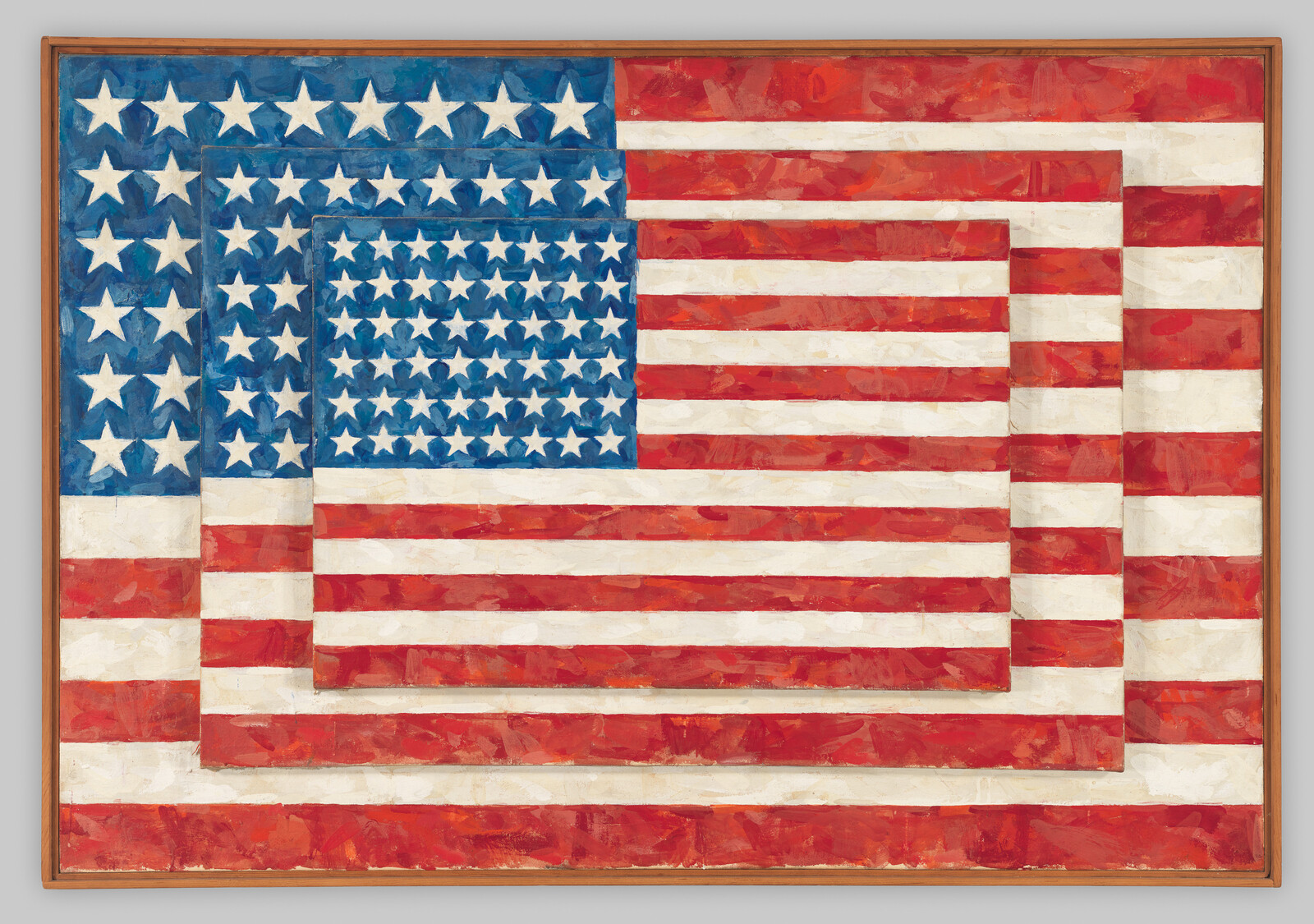
Videos
-
Jasper Johns’s Three Flags with Scott Rothkopf -
Jasper Johns, Three Flags | Video in American Sign Language
Audio
-
0:00
Three Flags
0:00
Narrator: In Three Flags—as in the other works in this room—Johns pictures what he called a “thing that the mind already knows.” And yet the paintings themselves can be quite surprising due to the ways he approaches his subjects. For example, it’s always worth looking closely at the surfaces of the works.
Scott Rothkopf: He used his signature technique of encaustic and newspaper collage, which you can see if you look up close.
Narrator: Scott Rothkopf.
Scott Rothkopf: Encaustic was a pretty unusual medium when Johns started using it in the 1950s. It’s basically hot wax that the artist warms on a plate with pigment mixed in. Then, he would paint it onto the surface while it was still warm, and it would dry very quickly on the canvas in a way that congealed or froze the mark almost like a sculpture on the surface. This was really different than, say, painting with oil, where the brush strokes might mush into one another and take a long time to dry.
Narrator: Johns liked the way that this process recorded his activity as a painter, emphasizing the act of making—and not just the finished result.
Three Flags
-
0:00
Jasper Johns, Three Flags, 1958
0:00
Scott Rothkopf: Muchos han discutido si esta imagen es patriótica o si, de cierta manera, es crítica del gobierno estadounidense. Parte de su atractivo duradero radica en que aún no llegamos a un consenso. Es interesante pensar que ver tantas banderas pudiera evocar desfiles, patriotismo y cierta celebración festiva de la cultura estadounidense y, sin duda, esta pintura fue realizada en un momento muy interesante en la historia del país, cuando imperaba un sentimiento triunfal después de la Segunda Guerra Mundial, así como el temor por la Guerra Fría y la represión de la época de los años cincuenta. En ese contexto, la bandera bien podía parecer casi opresiva, una suerte de imagen exagerada del gobierno estadounidense, del patriotismo, del patrioterismo, que a veces representa algo que no es tan positivo como nos gustaría que fuese.
Jasper Johns, Three Flags, 1958
In The Whitney's Collection: Selections from 1900 to 1965 and Where We Are (Spanish)
-
0:00
Jasper Johns, Three Flags, 1958
0:00
Scott Rothkopf: Soy Scott Rothkopf, Curador en jefe Familia Nancy y Steve Crown en el Whitney Museum.
Ahora contemplamos la pintura llamada Three Flags de Jasper Johns. Fue realizada en 1958, alrededor de cuatro años después de que Johns hiciera su primera pintura de una bandera. El artista dijo que pintó una bandera por vez primera porque la soñó y porque le interesaba pintar objetos que, como explicó, “ya fueran conocidos por la mente”. Es decir, aquellos objetos que vemos en nuestra vida cotidiana y que el artista no inventa. En ese sentido, la bandera también formó parte de una serie que incluía blancos, números y otras formas que Jasper Johns no inventó sino que estaban muy presentes en la cultura y las imágenes que lo rodeaban.
Estas series fueron muy radicales en su época, pues la mayoría de las pinturas que el artista veía y admiraba en Nueva York eran lienzos expresionistas abstractos llenos de trazos agresivos, emocionantes, de marcas bellas y diáfanas que los pintores, supuestamente, hacían directamente en la superficie y que inventaban como una manera de pensar acerca de la representación de un mundo nuevo. En cambio, todos podían reconocer en esta obra de Johns, la bandera, un símbolo muy común.
Narrator: Si desea escuchar más acerca de la manera en que Johns usó la bandera estadounidense, por favor, haga clic para continuar.
Jasper Johns, Three Flags, 1958
In The Whitney's Collection: Selections from 1900 to 1965 and Where We Are (Spanish)
-
0:00
Jasper Johns, Three Flags, 1958
0:00
Mark Joshua Epstein: Esta es una pintura llamada Three Flags, realizada en 1958 por el artista Jasper Johns.
Estudiante 1: Pareciera que, como hay muchas capas de la bandera estadounidense, quizás esté mostrando que hay muchos tipos de personas y cosas diferentes en Estados Unidos.
Estudiante 2: Bueno, en primer lugar, a mí me parece una ilusión óptica porque es grande, pequeña y luego más pequeña.
Estudiante 1: Creo que el artista tuvo la idea de hacer algo con la bandera estadounidense. Pensó que se vería genial, que podía superponer un par de banderas, una sobre la otra; no creo que tenga un significado realmente.
Mark Joshua Epstein: Jasper Johns dijo que la bandera estadounidense es algo que vemos pero que no miramos con atención, ¿qué creen que quiso decir?
Estudiante 1: Bueno, de alguna manera, es algo que damos por hecho. ¡Ah! Lo vemos todos los días.
Estudiante 2: Creo que usó varias capas para hacerla más interesante, así te obliga a prestar atención y leer lo que dice el letrero, a aprender algo sobre ella e interesarte por ella en lugar de solo decir “¡Mira! La bandera estadounidense. Listo, siguiente pintura”.
Jasper Johns, Three Flags, 1958
In “Untitled” (America) and Where We Are (Kids, Spanish)
-
0:00
Jasper Johns, Three Flags, 1958
0:00
Mark Joshua Epstein: This is a painting called Three Flags that was made in 1958, by the artist Jasper Johns.
Student 1: It looks like since there are a lot of layers of the American flag, maybe it’s showing that there are a lot of different kinds of people and things in America.
Student 2: Well, first it looks like an optical illusion to me because it’s big, small, and then smaller.
Student 3: I think the artist had this idea, like I’m going to make something with the American flag. They just thought it would look cool, they just stacked a couple of American flags on top of each other. I don’t think it has an actual meaning.
Mark Joshua Epstein: Jasper Johns talked about the American flag as something we see, but that we don’t look at. What do you think he meant?
Student 1: Well, we just kind of just take it for granted. Oh! We see that every day.
Student 2: I think they layered it to make it interesting, so you actually look at it closely and read what the sign says and learn about it and actually get into it, rather than just being oh! that’s the American flag. Next picture.
Jasper Johns, Three Flags, 1958
In The Whitney's Collection: Selections from 1900 to 1965 and Where We Are (Kids)
-
0:00
Jasper Johns, Three Flags, 1958
0:00
Scott Rothkopf: A lot of people have debated whether this image is patriotic on the one hand or somehow critical of the American government, and part of its enduring appeal is that we just can’t decide. It’s interesting to think that seeing so many flags could recall parades, patriotism, a kind of festive embrace of American culture, and certainly this painting was made at a very interesting time in American history if we think of the triumphant feeling after World War II, as well as the fear of the Cold War, the repression of the 1950s era. In that way the flag could seem almost oppressive in this case, this kind of exaggerated image of American government, of patriotism, of jingoism, which sometimes stands for things that are not quite as positive as we would like them to be.
Jasper Johns, Three Flags, 1958
In The Whitney's Collection: Selections from 1900 to 1965 and Where We Are
-
0:00
Jasper Johns, Three Flags, 1958
0:00
Scott Rothkopf: We’re looking at a painting called Three Flags by Jasper Johns.
Narrator: Scott Rothkopf is the Alice Pratt Brown Director of the Whitney Museum.
Scott Rothkopf: It was painted in 1958, about four years after Johns made his first painting of a flag. He said that he painted a flag the first time because it was something that came to him in a dream and he also was interested in painting things that he said “are things the mind already knows.” That is, things that we see in our daily lives that the artist doesn’t make up. In that sense, the flag was also in a series that also included targets, numbers, and other forms that Johns didn’t invent, but could take right out of the culture and the images that were all around him.
At the time he did this, it was a really radical act because most of the painting that he would have seen in New York and admired were abstract expressionist canvases that were full of aggressive, exciting, something beautiful and diaphanous marks that painters supposedly made directly on the surface and invented as a way of thinking about picturing a new world. This, by contrast, was something we could all recognize, a flag, a really common symbol.
Jasper Johns, Three Flags, 1958
In The Whitney's Collection: Selections from 1900 to 1965 and Where We Are
-
0:00
Jasper Johns, Three Flags, 1958
0:00
Narrator: This painting by Jasper Johns, called Three Flags, was made in 1958. Todd Gitlin is a professor at the Columbia School of Journalism and a scholar of American culture of the 1960s.
Todd Gitlin: . . .he's neither celebrating the flag nor. . .stabbing it in the heart. He's. . .to use a later term, deconstructing it. . .[A]nother way to put it is that he's inviting you to become innocent. He's inviting you to look at these things as if you were a Martian. . .And just to stare at them and to take them as natural artifacts.
[T]he question is not just why is Johns painting these flags and numbers and letters but. . .why are other people buying them, exhibiting them, find them interesting. . .
[T]here is an argument to be made that he is retailing. . .in the fifties
a sort of soft aestheticizing of the sacred national symbol in a way that. . .flatters or honors the nation. . .but without genuflection. That is, he's appropriating with. . .a frisson of individuality. . .an attitude of approval which incorporates a brief moment of disapproval and so he's sort of. . .signing on to Americanism. . .as a graceful dissenter.
And in a world that's increasingly cluttered by symbols. . .cluttered with. . .artifacts that are mass produced. Cluttered. . .with noise and. . .slogan. . .and so on.. .that the proper attitude to take toward all of that is a kind of. . .amused, distant, as Rolling Stone would later put it, cosmic giggle.
But in the meantime I think he's also saying. . .and it's part of his appeal to the zeitgeist that he's saying to the world of. . .intellectuality, shut up. Just shut up. Shut up and look.
Jasper Johns, Three Flags, 1958
In America Is Hard to See and American Legends: From Calder to O'Keeffe
Exhibitions
-
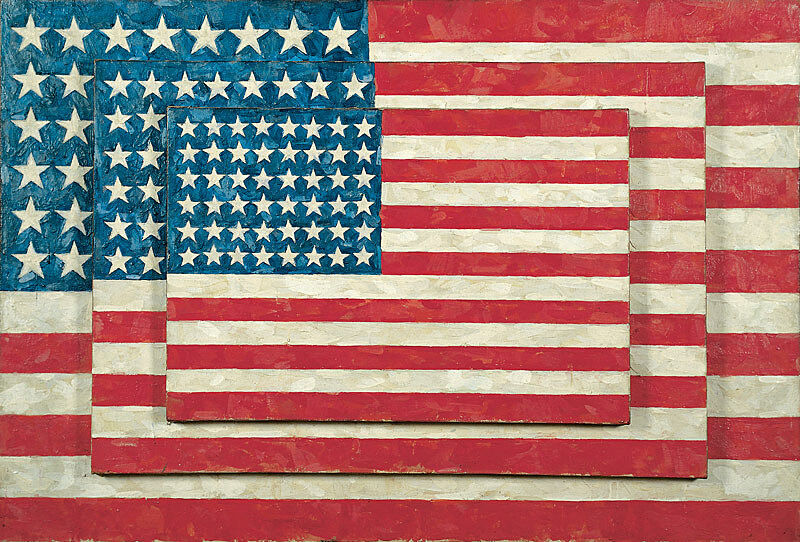
Jasper Johns: Mind/Mirror
Sept 29, 2021–Feb 13, 2022
-
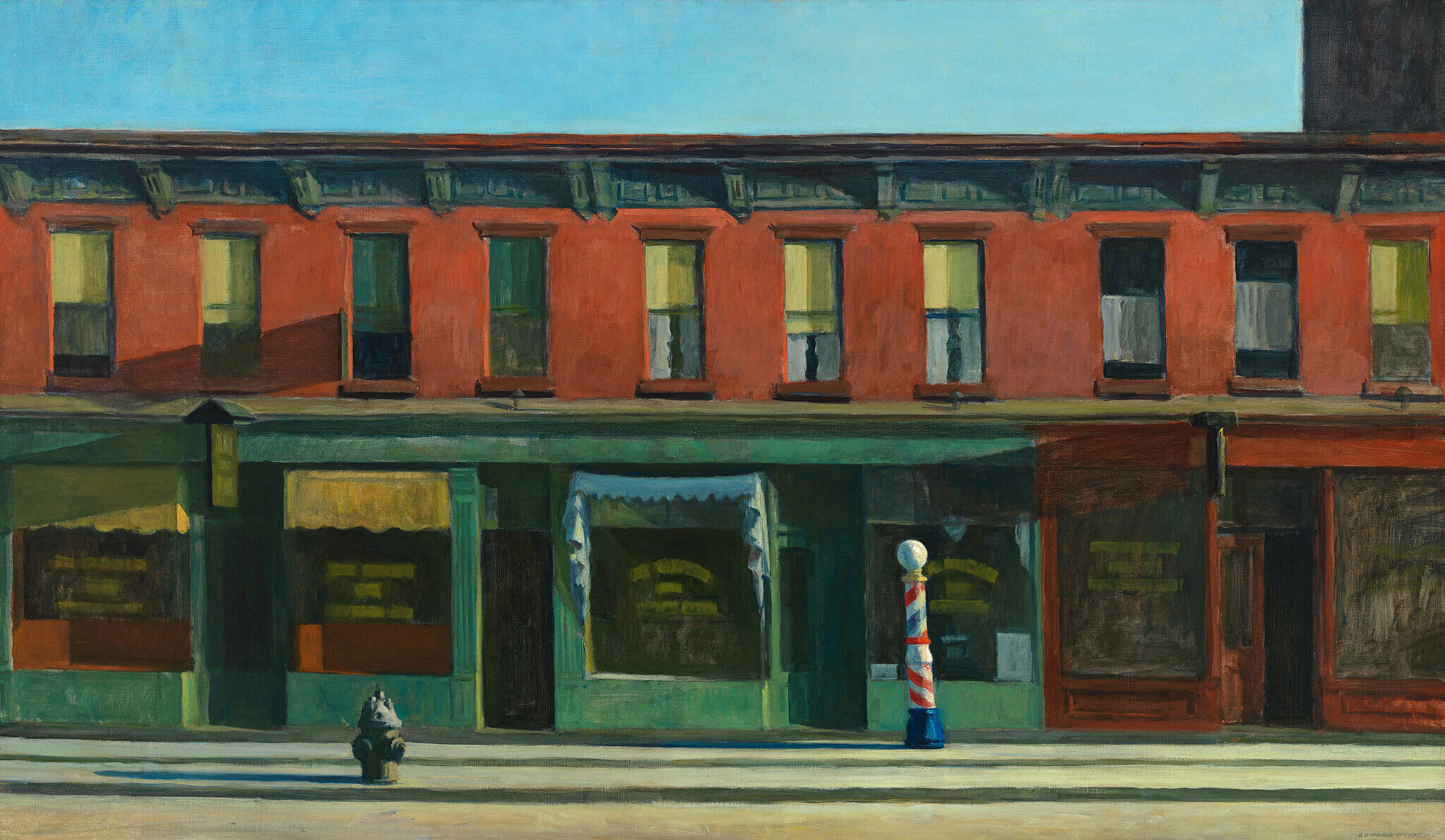
The Whitney’s Collection: Selections from 1900 to 1965
June 28, 2019–May 1, 2025
-
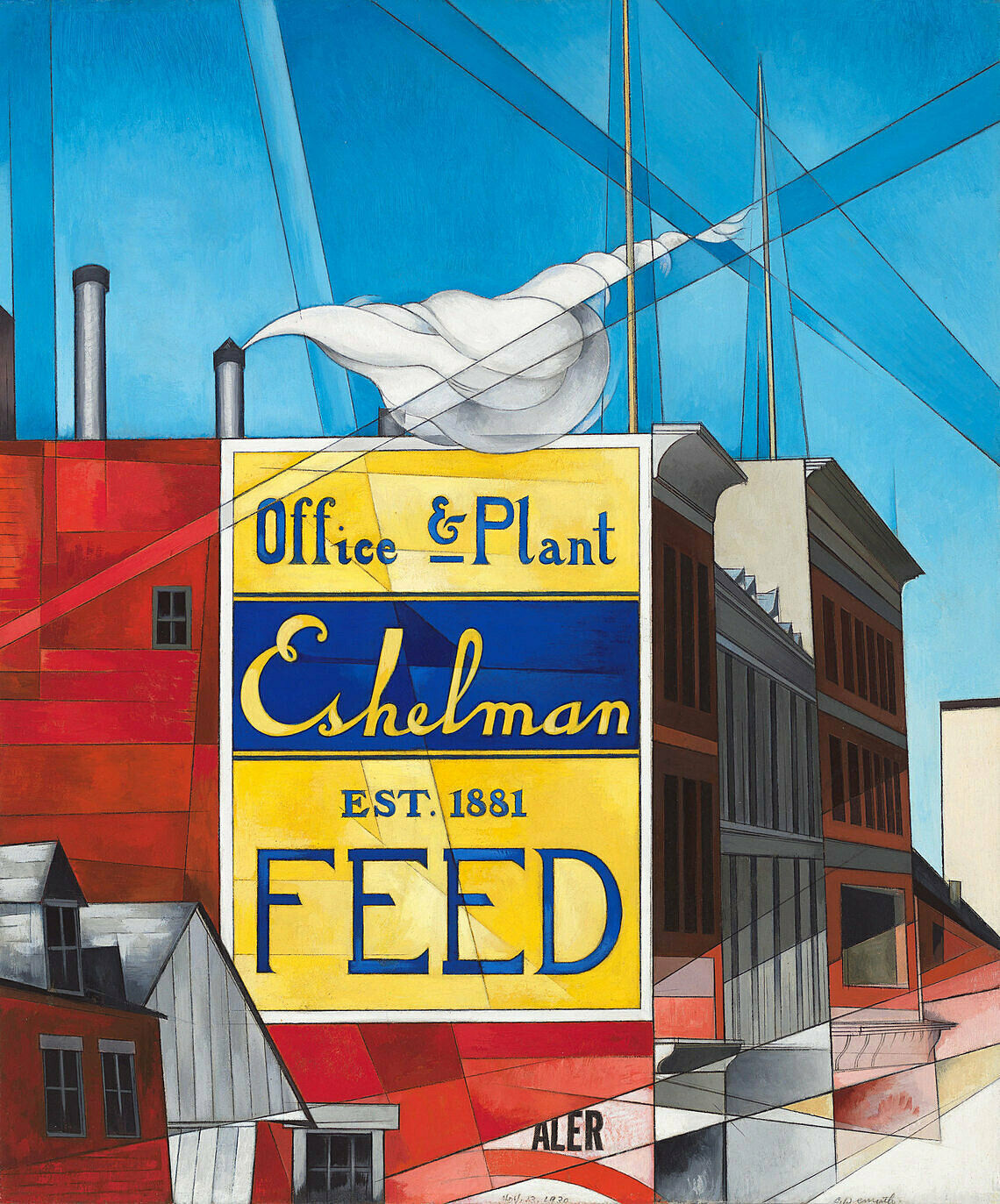
Where We Are: Selections from the Whitney’s Collection, 1900–1960
Apr 28, 2017–June 2, 2019
-

America Is Hard to See
May 1–Sept 27, 2015
-
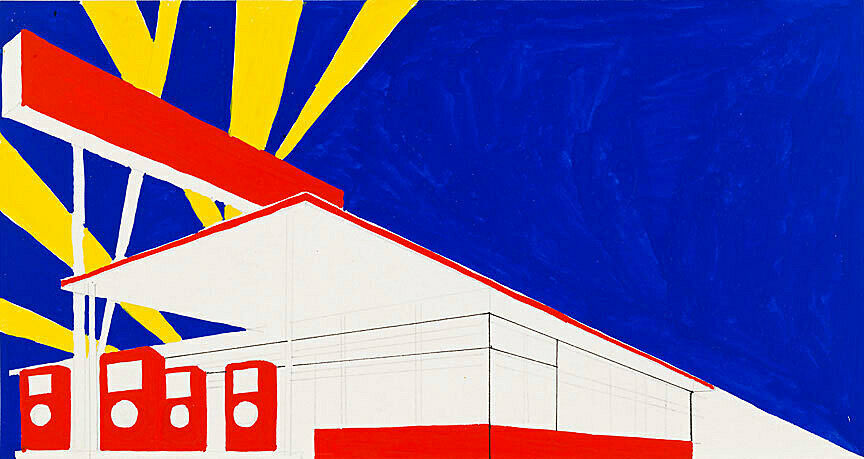
Shaping a Collection: Five Decades of Gifts
July 17–Oct 19, 2014
-
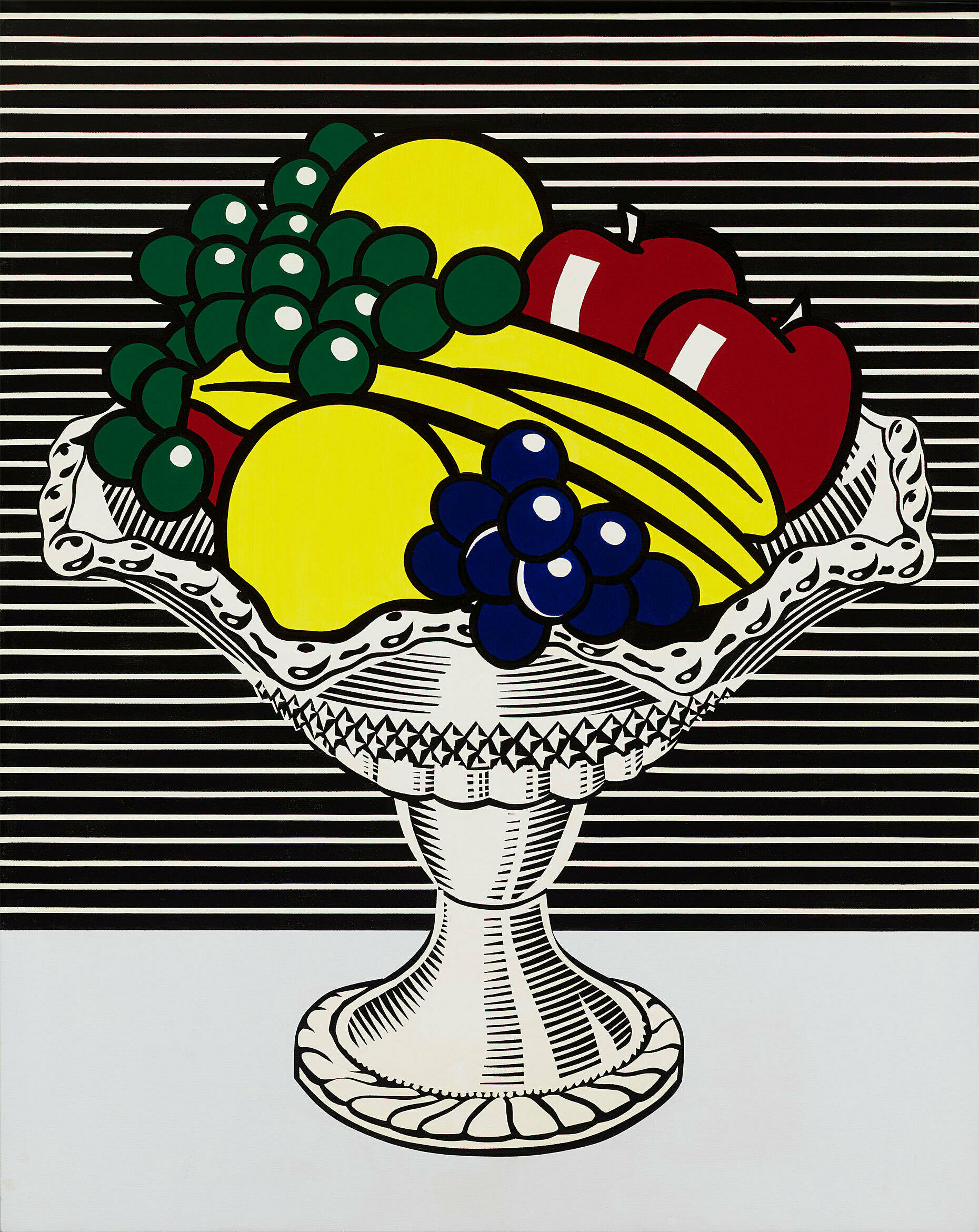
American Legends: From Calder to O’Keeffe
Dec 22, 2012–June 29, 2014
-

Singular Visions
Dec 16, 2010–Aug 5, 2012
-
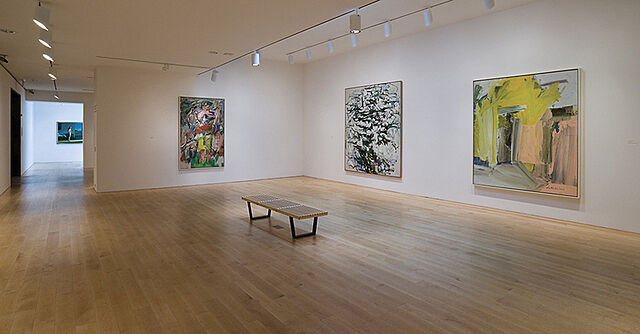
The Whitney’s Collection
Jan 30, 2008–Jan 3, 2010
-
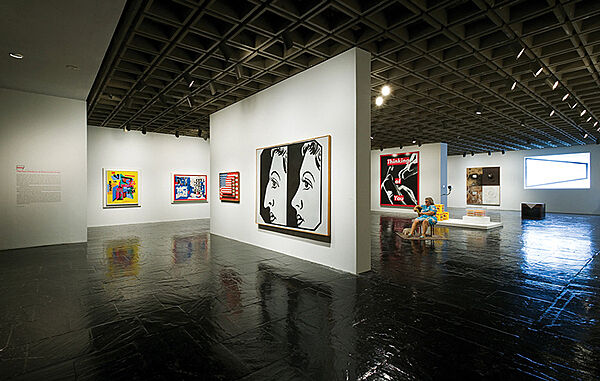
Full House: Views of the Whitney’s Collection at 75
June 29–Sept 3, 2006
-

Pop/Concept: Highlights from the Permanent Collection
July 1–Oct 24, 2004
-
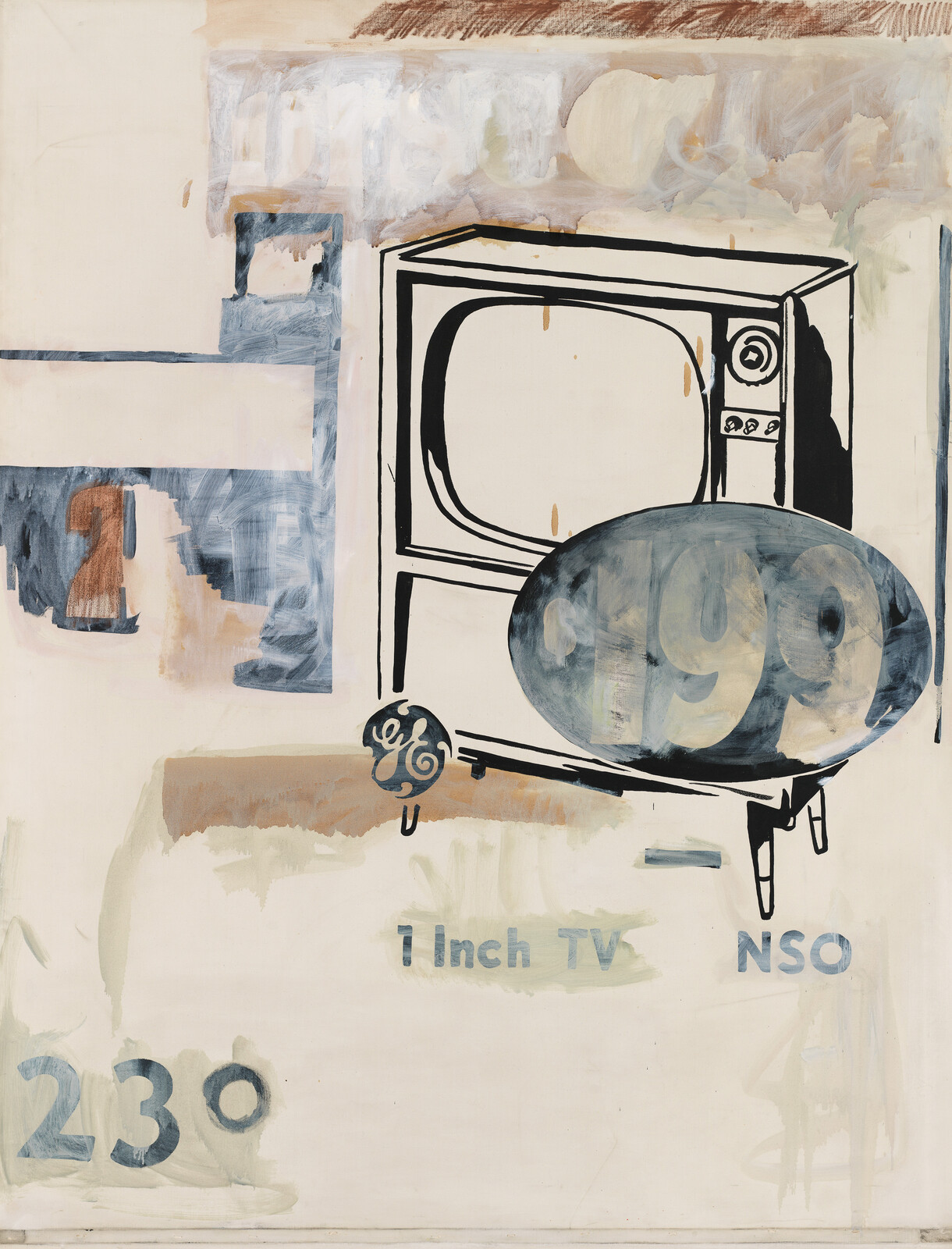
De Kooning to Today: Highlights from the Permanent Collection (2nd floor–Oct 2002)
Oct 10, 2002–Mar 2, 2003
-
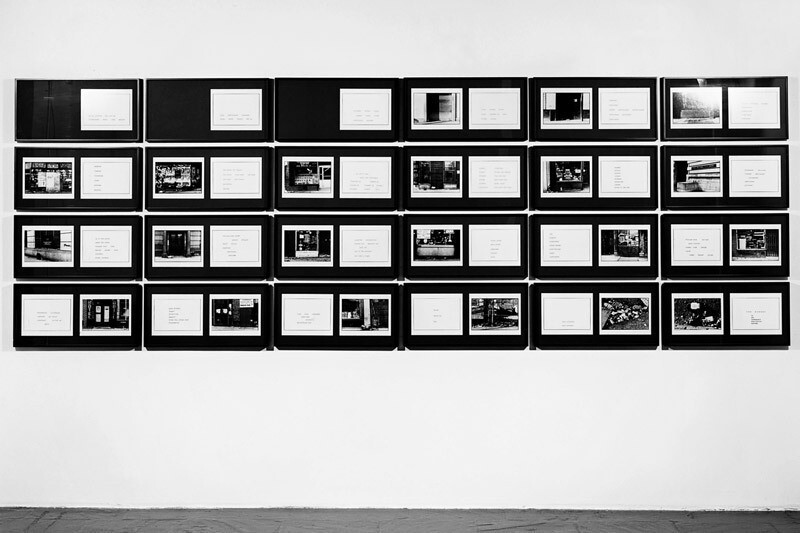
Highlights from the Permanent Collection: From Pollock to Today
Dec 7, 2000–Feb 10, 2002
-
From the Collection: Photography, Sculpture and Painting
July 14, 1994–Feb 26, 1995
Installation photography
-
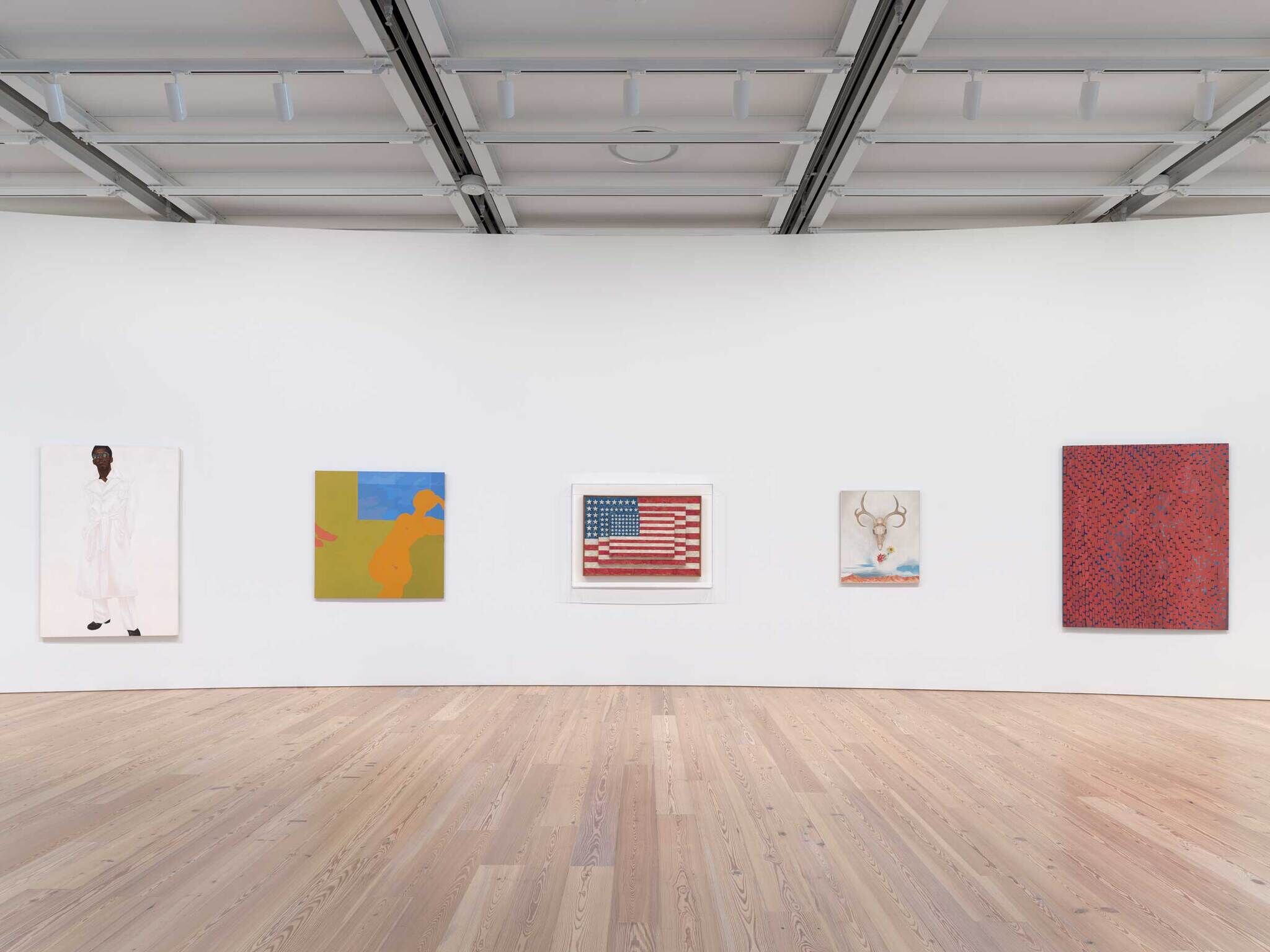

Installation view of “Untitled” (America) (Whitney Museum of American Art, New York, July 5, 2025-). From left to right: Barkley L. Hendricks, Steve, 1976; Kay WalkingStick, April Contemplating May, 1972; Jasper Johns, Three Flags, 1958; Georgia O’Keeffe, Summer Days, 1936; Alma Thomas, Mars Dust, 1972. Photograph by Ron Amstutz
From the exhibition “Untitled” (America)
-
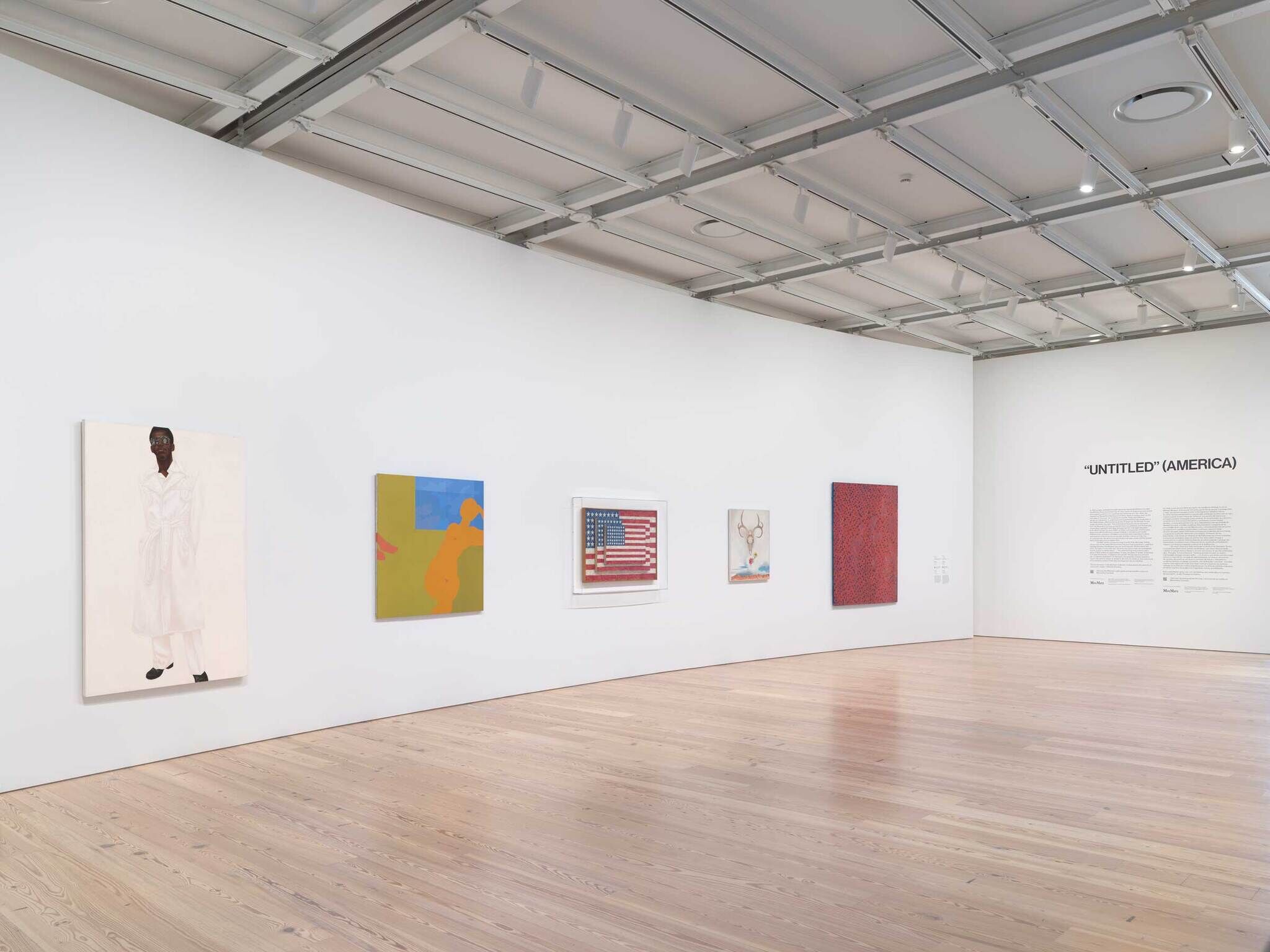

Installation view of “Untitled” (America) (Whitney Museum of American Art, New York, July 5, 2025-). From left to right: Barkley L. Hendricks, Steve, 1976; Kay WalkingStick, April Contemplating May, 1972; Jasper Johns, Three Flags, 1958; Georgia O’Keeffe, Summer Days, 1936; Alma Thomas, Mars Dust, 1972. Photograph by Ron Amstutz
From the exhibition “Untitled” (America)
-
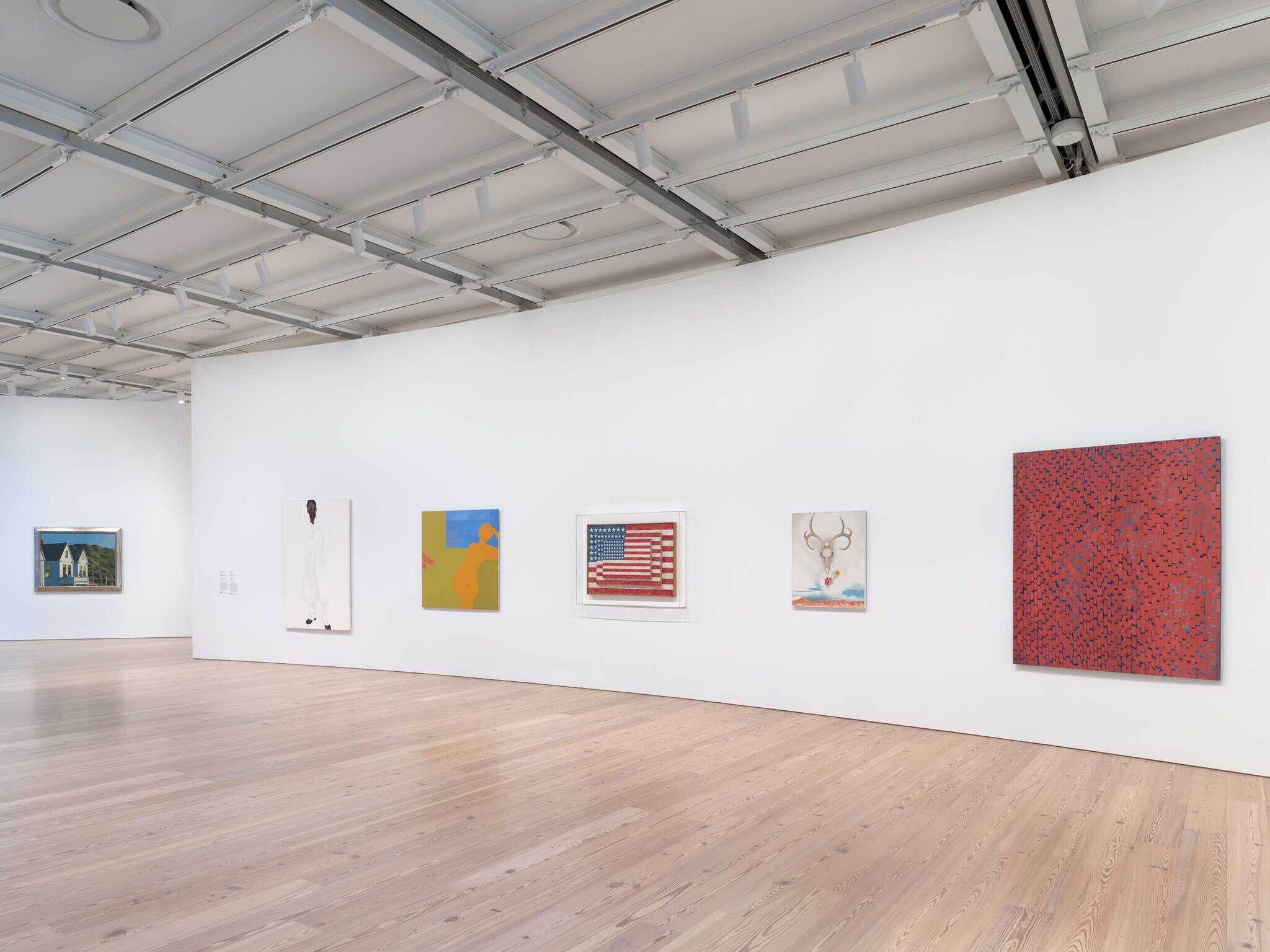

Installation view of “Untitled” (America) (Whitney Museum of American Art, New York, July 5, 2025-). From left to right: Edward Hopper, Second Story Sunlight, 1960; Barkley L. Hendricks, Steve, 1976; Kay WalkingStick, April Contemplating May, 1972; Jasper Johns, Three Flags, 1958; Georgia O’Keeffe, Summer Days, 1936; Alma Thomas, Mars Dust, 1972. Photograph by Ron Amstutz
From the exhibition “Untitled” (America)
-
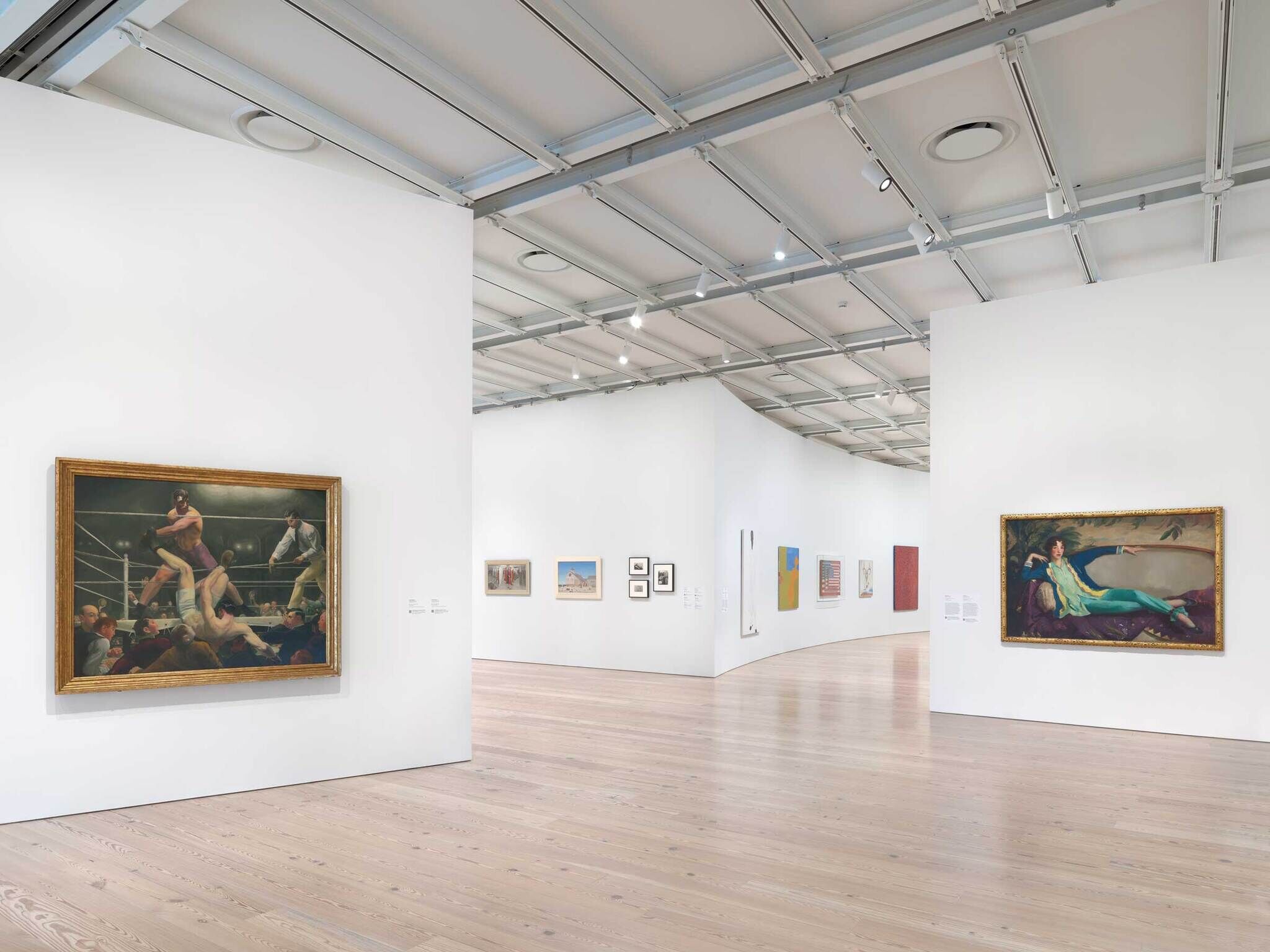

Installation view of “Untitled” (America) (Whitney Museum of American Art, New York, July 5, 2025-). From left to right: George Bellows, Dempsey and Firpo, 1924; George Tooker, The Subway, 1950; Margaret French, The Moon by Day, 1939; PaJaMa, Margaret French, George Tooker and Jared French, Nantucket, c. 1946; PaJaMa, Margaret French, Paul Cadmus and José Martinez, Fire Island, 1939; PaJaMa, Chuck Howard and Ted Starkowski, 1953; Barkley L. Hendricks, Steve, 1976; Kay WalkingStick, April Contemplating May, 1972; Jasper Johns, Three Flags, 1958; Georgia O’Keeffe, Summer Days, 1936; Alma Thomas, Mars Dust, 1972; Robert Henri, Gertrude Vanderbilt Whitney, 1916. Photograph by Ron Amstutz
From the exhibition “Untitled” (America)
-
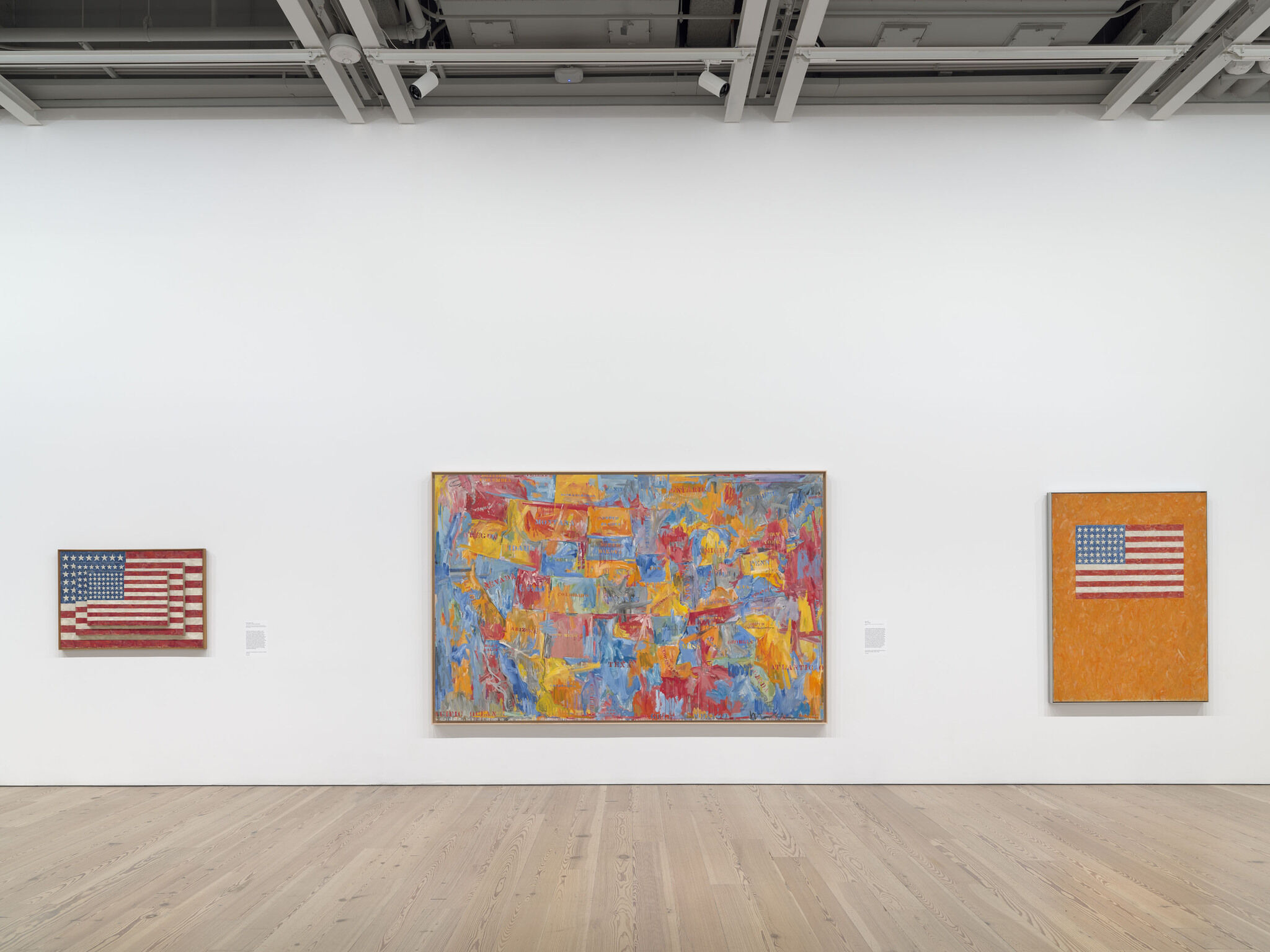

Installation view of Jasper Johns: Mind/Mirror (Whitney Museum of American Art, New York, September 29, 2021–February 13, 2022). From left to right: Three Flags, 1958; Map, 1961; Flag on Orange Field, 1957. Artwork © Jasper Johns / Licensed by VAGA at Artists Rights Society (ARS), New York. Photograph by Ron Amstutz
From the exhibition Jasper Johns: Mind/Mirror
-
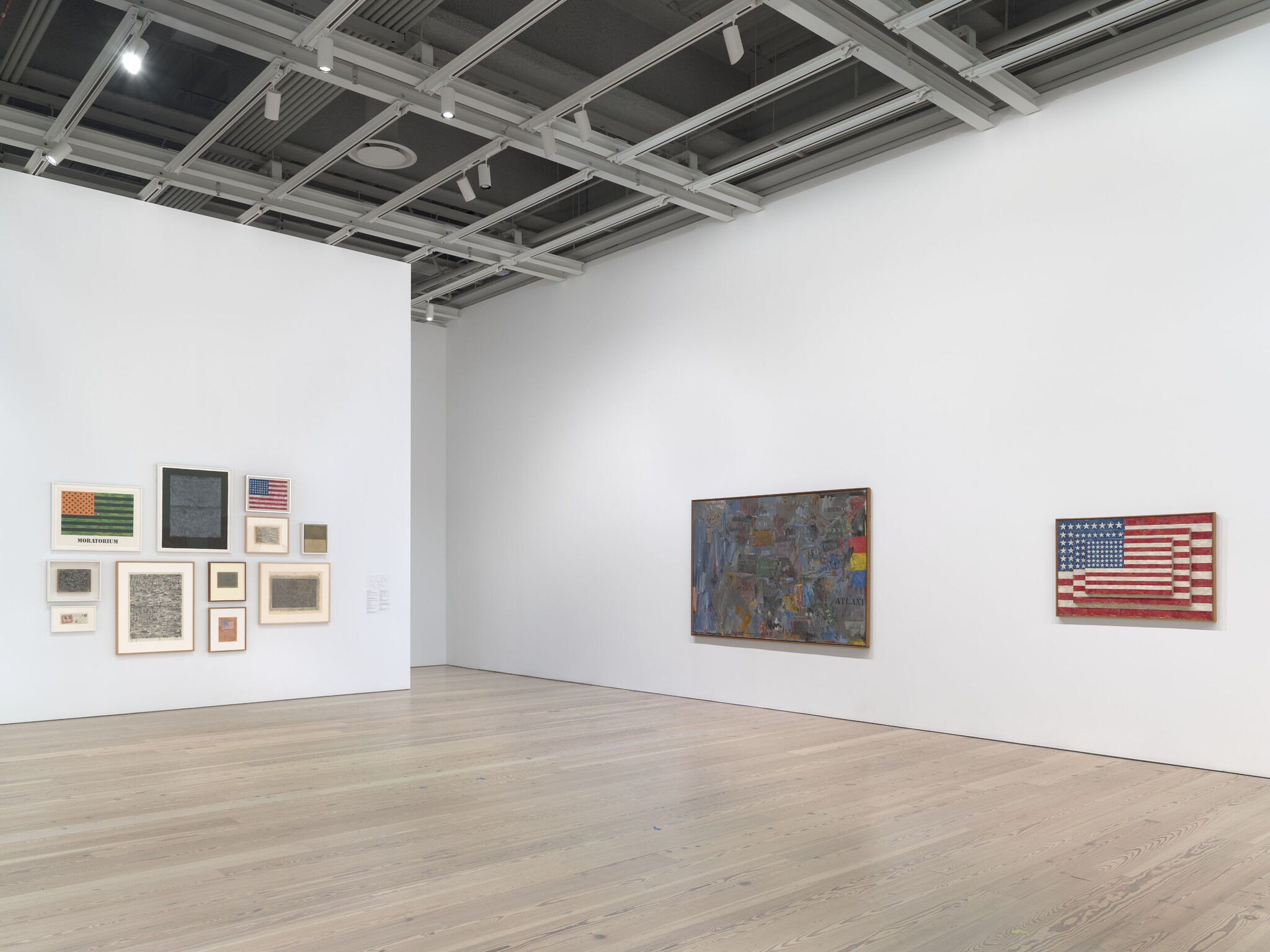

Installation view of Jasper Johns: Mind/Mirror (Whitney Museum of American Art, New York, September 29, 2021–February 13, 2022). On left, clockwise from top left: Moratorium, 1969; Two Maps I, 1966; Flag, 1957; Flag, 1958; Green Map above White, 1966–67; Map, 1965; Flag on Orange Field, 1957; Green Flag, 1956; Two Flags, 1960; Untitled (Envelope), 1959; Map, 1960; From left to right: Map, 1963; Three Flags, 1958. Artwork © Jasper Johns / Licensed by VAGA at Artists Rights Society (ARS), New York. Photograph by Ron Amstutz
From the exhibition Jasper Johns: Mind/Mirror
-
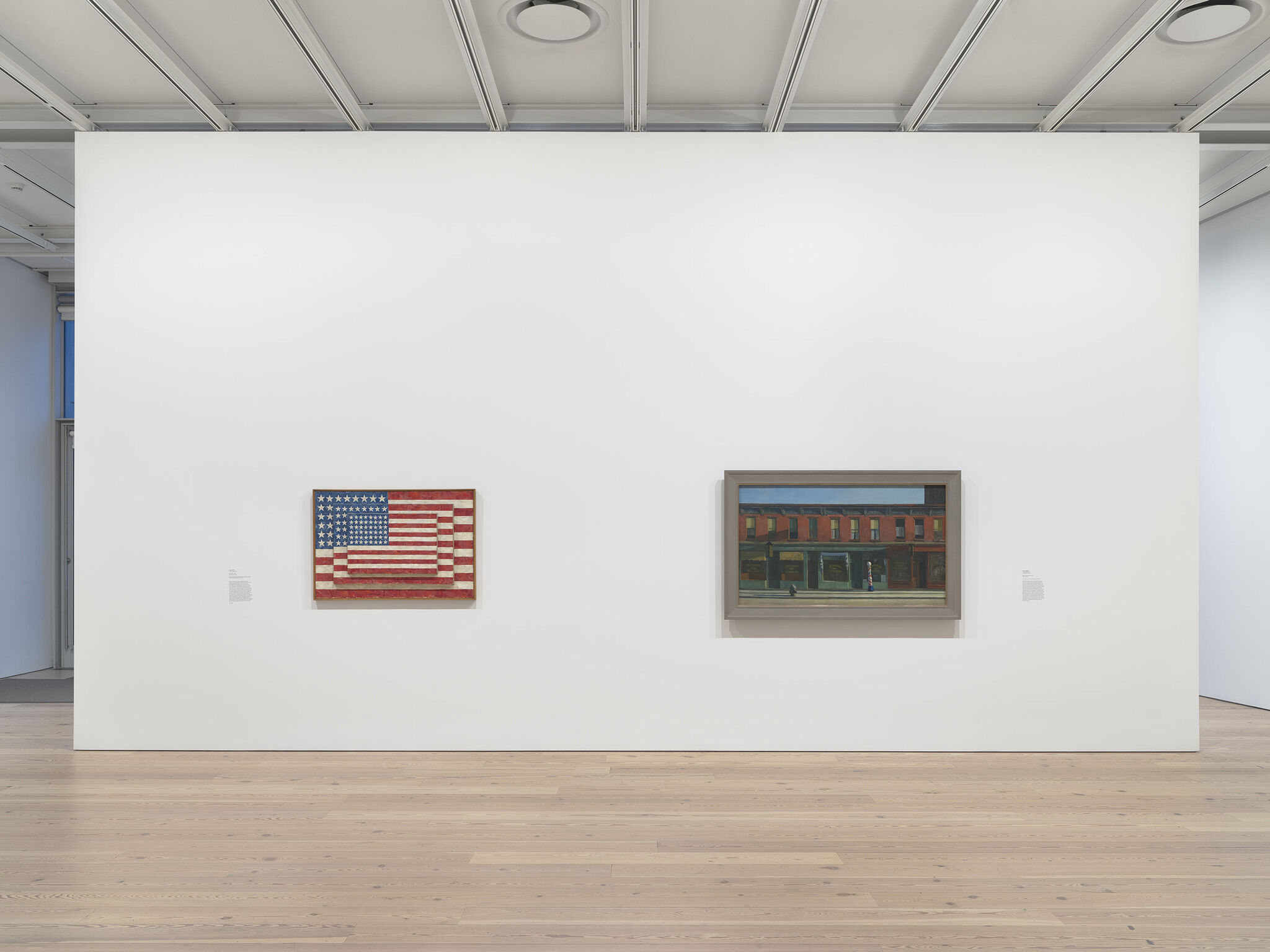

Installation view of Where We Are: Selections from the Whitney’s Collection, 1900–1960 (Whitney Museum of American Art, New York, April 28, 2017–June 2, 2019). From left to right: Jasper Johns, Three Flags, 1958; Edward Hopper, Early Sunday Morning, 1930. Photograph by Ron Amstutz
From the exhibition Where We Are: Selections from the Whitney’s Collection, 1900–1960
-
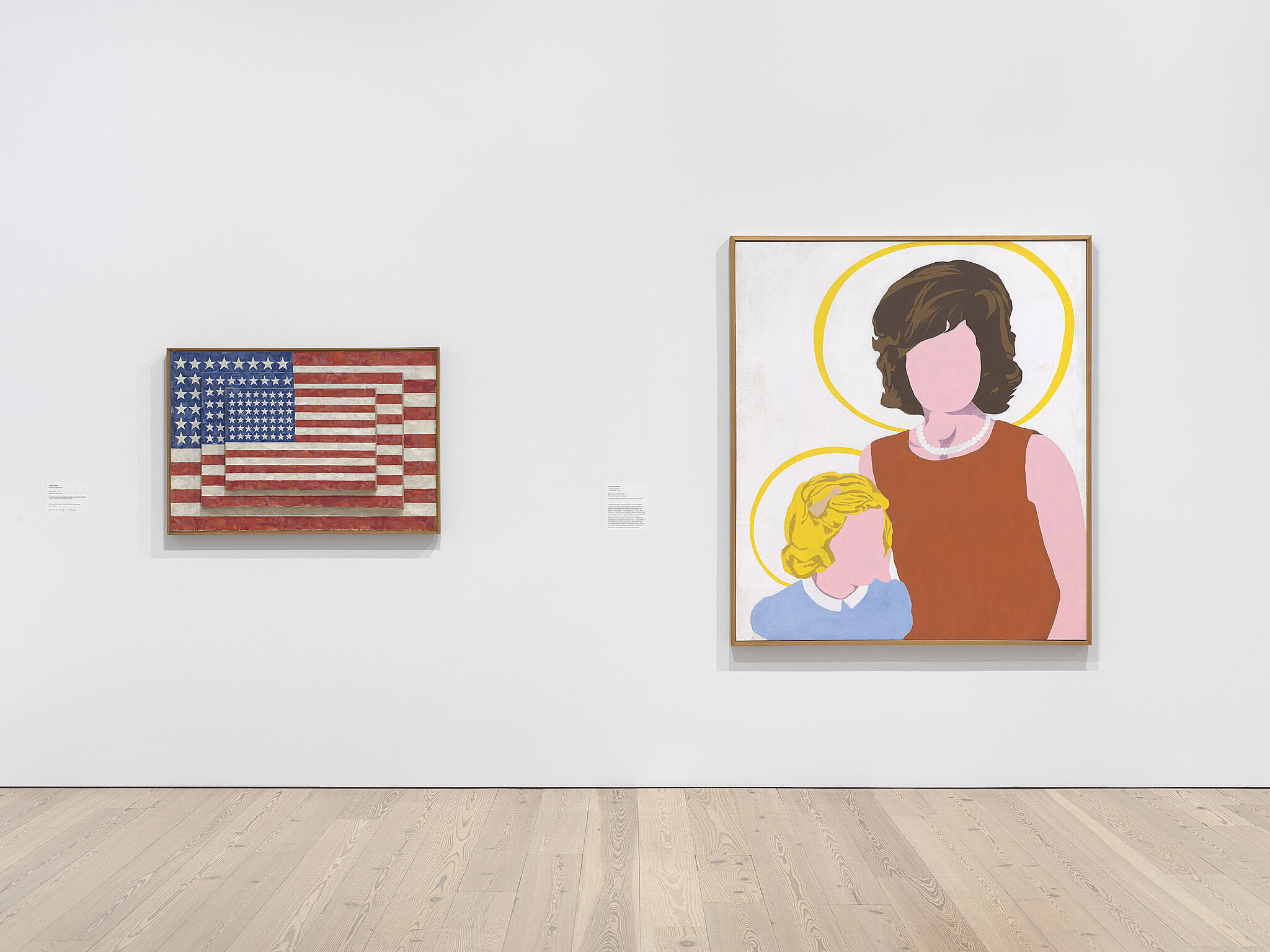

Installation view of The Whitney’s Collection: Selections from 1900 to 1965 (Whitney Museum of American Art, New York, June 28, 2019- ). From left to right: Jasper Johns, Three Flags, 1958; Allan D’Arcangelo, Madonna and Child, 1963. Photograph by Ron Amstutz
From the exhibition The Whitney’s Collection: Selections from 1900 to 1965

